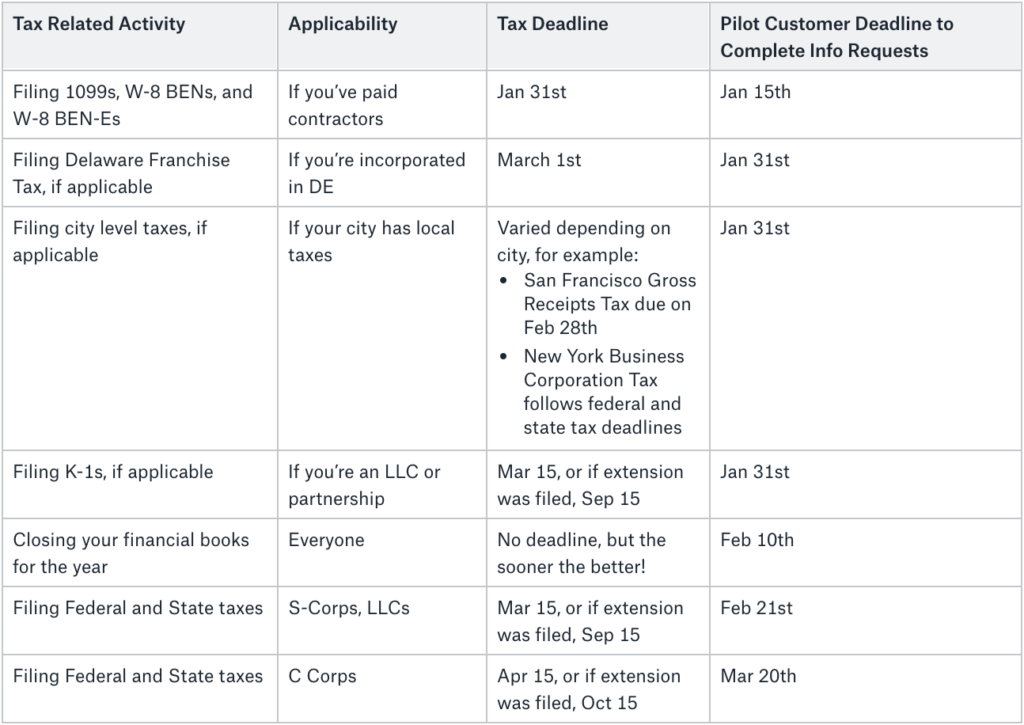Pilot’s Guide to Navigating Tax Deadlines
A confirmation email has been sent to your email.

The end of the year is a busy season for most people, but especially for startup founders, e-commerce entrepreneurs, and small business owners. Holidays, travel, and time with family can collide with wrapping up the fiscal year, closing your books, and getting ready for the year to come. Plus, many businesses are in the midst of peak holiday sales. Not exactly a time when you want to be consumed with taxes, bookkeeping, and back-office hassles. That’s where Pilot comes in.
Pilot is bookkeeping made better. We’ve created this simple guide to help you navigate tax obligations during this end of year. Before we jump into specific topics, it’s important to know all the important deadlines associated with tax season (see table below). Alternatively, you can sign up for Pilot Tax, and we can take care of all of this for you.
Tax related deadlines

Best practices & guidelines
As you can see, there’s a lot to do to make sure everything goes smoothly. There’s no worse headache than finding out you skipped a filing or missed a payment deadline. To prevent that, check out the next few sections, where we go through some helpful tips and best practices that we recommend to all our Pilot customers.
Closing your books for the fiscal year
Before you do anything, it’s important to work with your bookkeeping team to close your financials for the year. This helps to make sure that your tax preparer has a set of financials they can use to start preparing filings with minimal back-and-forth.
Closing your books includes:
- Re-confirming balance sheet items
- Resolving any open liabilities
- Making any other end of year adjustments as necessary.
At Pilot, we work with our customers throughout December and January to resolve any open questions, then hand off closed books to the Pilot Tax team.
Forms 1099, W-8 BEN, and W-8BEN-E
If you’ve paid any contractors* (LLCs or individual independent contractors) or lawyers more than $600 in the fiscal year, you’ll have to file Form 1099 with the IRS for each entity and also send those forms to the entities themselves. Ideally, we recommend that businesses collect W-9 forms from each such contractor or lawyer which makes the 1099 generation a lot easier. However, if you didn’t do this, don’t worry — the Pilot Tax team has an automated process to collect the necessary info and generate 1099s on time.
Similarly, if you’ve paid any foreign contractors or entities in the fiscal year, regardless of the amount, you’re required to fill out Forms W-8 BEN and W-8 BEN-E for each such foreign contractor or entity. Pilot Tax takes care of this as well. Simply let us know through Pilot.com about each foreign contractor or entity, and we’ll handle the rest.
* Some payroll systems(e.g. Gusto, Rippling, Zenefits, Upwork) handle 1099 generation if you used those systems to pay your contractors and lawyers, so you can skip this step if you exclusively used those systems.
Delaware Franchise Tax
Not all companies need to care about this, but given the large percentage of companies that incorporate in Delaware, this guide would feel incomplete without it! The Delaware Division of Corporations levies a minimum tax of $175 and a minimum filing fee of $50 (total of $225/year) for any company incorporated in Delaware. The tax calculation depends on gross assets and issued shares. Pilot Tax makes this easy by looking at your financials for the year, which have been closed by the time Delaware Franchise Tax is due, and your cap table.
City level taxes
It can be easy to forget about city-specific taxes, especially if you have multiple work locations, which is why we help you take care of them with Pilot Tax. Cities may levy additional taxes on top of the federal and state taxes you’re used to seeing. With Pilot Tax, our team will help determine if you have additional tax obligations based on your location and the cost for filing those taxes.
For example, San Francisco and New York both have city level taxes — the Gross Receipts Tax and the Business Corporation Tax, respectively. While our customers are responsible for the initial registration and associated fees, our team can then take these types of city-level tax filings off your plate.
K-1 filings
If you are a single member LLC, then you don’t need any Schedule K-1 filings. But other LLCs who choose to be treated as a Partnership for tax purposes need to issues Schedule K-1s for all the investors or shareholders of the company. The Pilot Tax team has lots of experience dealing with simple and complicated K-1 filings, so we are here to help.
Federal and State taxes
Finally, after getting through all the twists and turns of tax time, we’re on the final stretch — state and federal taxes. S-Corps and LLCs typically have to file by March 15th and C-Corps have to file by April 15. However, the best practice is to file for a 6-month extension and file by September or October 15th respectively. This gives everyone a little more breathing room to make sure we get everything just right. In any case, by that time our bookkeeping team will have taken care of closing the books for the tax year, so preparing and filing tax returns is a smooth process.
Some companies might need to make estimated payments on a quarterly basis. Additionally, some companies might not know all the jurisdictions they need to file in. The Pilot Tax team can help out with both of these cases. We’ll identify these issues during onboarding to make sure you have zero surprises at tax time.
More taxes!
Woohoo! Great job for making it this far — but we’re not done yet. There are plenty of other tax related topics to think through. Do you need to start thinking about Sales Tax? Do you qualify for R&D Tax credits based on your research and development investments? Do you need to change your accounting method for tax purposes? The Pilot Tax team has a lot of experience with all of these issues and can help you navigate through them.
Sign up for Pilot Tax
Hopefully, this guide has given you a good sense of all the things you need to take care of to get through tax season. As you’ve probably also guessed, Pilot has filed taxes for hundreds of customers through Pilot Tax. If you’re looking for a seamless hand-off between your bookkeeping and tax teams, a white glove experience for all your tax needs, and the peace of mind that comes with a trusted and dedicated tax preparer, reach out to our team. We’re ready to take care of your taxes.


